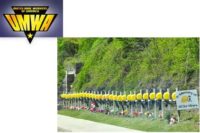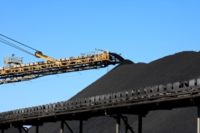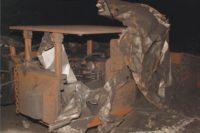 An advocacy group is charging that the $209 million settlement in the Upper Big Branch Mine disaster announced yesterday does not serve justice, and that the mine operator should instead face criminal prosecution for the deaths of 29 workers in an explosion on April 5, 2010.
An advocacy group is charging that the $209 million settlement in the Upper Big Branch Mine disaster announced yesterday does not serve justice, and that the mine operator should instead face criminal prosecution for the deaths of 29 workers in an explosion on April 5, 2010.
U.S. Attorney General Eric Holder said the settlement with Alpha Natural Resources, Inc. represents the largest-ever resolution in a ciminal investigaton of a mine disaster. At the time of the explosion, the mine was owned by Massey Energy Company, whose operations came under Alpha’s control in a June 1, 2011, merger.
Public Citizen, a non-profit Washington D.C.-based advocacy organizatioin, said the U.S. Attorney’s Office should have prosecuted Alpha, to hold the corporation criminally liable. "Instead, it opted for a non-prosecution agreement, in which there is no admission or finding of guilt – meaning a corporation can engage in reckless activity that leads to the deaths of 29 people and still escape criminal prosecution," according to a statement by the group.
Public Citizen singled out former Massey CEO Don Blankenship for particular censure, saying he "pursued high profits at the cost of his workers' lives." Blankenship received a $33 million dollar "golden parachute" when he left the company. Under the settlement agreement, Alpha will pay $1.5 million to each family of the deceased.
As part of the non-prosecution agreement, Alpha will invest at least $80 million in mine safety improvements at all of its underground mines, including those formerly owned by Massey. Alpha will also place $48 million in a mine health and safety research trust, to be used to fund academic and non-profit research that will advance efforts to enhance mine safety. In addition, the company will pay restitution of $1.5 million to each of the families of the 29 miners who died at UBB and to the two individuals who were injured, for a total restitution payment of $46.5 million.
In a separate development, the Mine Safety and Health Administration (MSHA) announced that it has imposed a fine of $10,825,368, the largest in agency history, following its investigation into the Upper Big Branch disaster. A report concludes that Massey's corporate culture was the root cause of the tragedy. MSHA has issued Massey and PCC 369 citations and orders, including for an unprecedented 21 flagrant violations, which carry the most serious civil penalties available under the law.
MSHA concluded that the 29 miners died in a massive coal dust explosion that started as a methane ignition. While the investigation found the physical conditions that led to the coal dust explosion were the result of a series of basic safety violations at UBB, which PCC and Massey disregarded, the report cites unlawful policies and practices implemented by PCC and Massey as the root cause of the explosion – including the intimidation of miners, advance notice of inspections, and two sets of books with hazards recorded in UBB's internal production and maintenance book but not in the official examination book. The investigation found that the operator promoted and enforced a workplace culture that valued production over safety, including practices calculated to allow it to conduct mining operations in violation of the law.
"Massey management created a culture of fear and intimidation in their miners to hide their reckless practices," said MSHA Assistant Secretary Joseph A. Main, who said his agency's report revealed "the tragic consequences of a corporate culture that values production over people."
MSHA issued PCC and Massey 12 citations and orders deemed contributory to the cause of the accident, and nine of those violations were assessed as flagrant, which carry the highest possible penalties. Violations include illegally providing advance notice to miners of MSHA inspections; failing to properly conduct required examinations; allowing hazardous levels of loose coal, coal dust and float coal dust to accumulate; failing to adequately apply rock dust to the mine; failing to adequately train miners; and failing to comply with approved ventilation plans and approved roof control plans. MSHA also issued 357 citations and orders to PCC and Massey that did not contribute directly to the explosion, including 11 assessed as flagrant. Additionally, MSHA issued two contributory and two non-contributory violations to David Stanley Consulting LLC a contractor that supplied examiners and other miners to work at UBB for its examiner's failure to properly conduct examinations.
The remedial safety measures included in the agreement include the following:
• Installation of digital monitoring systems in all its underground mines to continuously monitor compliance with ventilation requirements and to ensure mines are free of potentially explosive methane gas;
• Implementation of a plan to ensure that each of its underground mines has the personnel and resources necessary to meet all legal requirements concerning incombustible material and accumulations of coal dust and loose coal;
• Purchase state-of-the-art equipment to monitor its mines for explosive concentrations of coal dust and use that equipment in all its underground mines;
• Purchase next-generation rock dusting equipment (pending MSHA approval), further enhancing its ability to combat explosion hazards;
• Installation of oxygen cascading systems to help miners make their way to safety if a serious accident should occur; and
• Building of a state-of-the-art training facility and implementation of a full training curriculum to train Alpha miners, which will be available to other mining companies.
Critics say justice not served by Upper Big Branch Mine settlement


